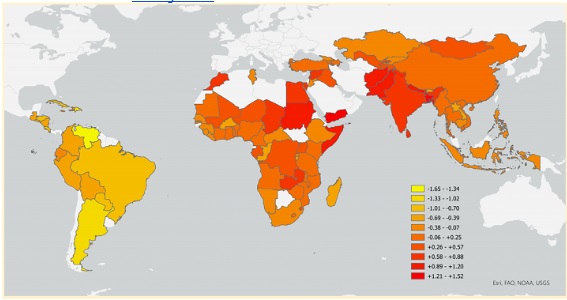Climate Impact on Women in Agri-Food Systems | 23 Nov 2023
For Prelims: Rashtriya Mahila Kisan Diwas, Loss and Damage Fund, Climate Change,
For Mains: Impact of Climate Change on Women Farmers, Role of Women in Agriculture, Employment & Output, Food Security
Why in News?
A recent study published in the journal Frontiers in Sustainable Food Systems highlights the unequal impact of the climate crisis on women engaged in agri-food systems across the globe.
- The research sheds light on the vulnerability of women in agricultural sectors and identifies hotspots where climate risks are most severe.
Note:
- Agri-food systems are the networks of people, activities, and resources that produce, process, distribute, and consume food.
- They include farmers, traders, processors, retailers, consumers, and others, who are involved in the food value chain.
What are the Key Highlights of the Study?
- Global Ranking of Climate Change Threats:
- The study ranks 87 countries based on the climate change threat faced by women in agri-food systems.
- India ranks 12th, with other Asian nations like Bangladesh, and Pakistan, Afghanistan, and Nepal also facing significant risks.
- The study ranks 87 countries based on the climate change threat faced by women in agri-food systems.
- Identification of High-Risk Regions:
- Agri-food systems, encompassing production, post-harvest handling, and distribution, are particularly at risk.
- Within African and Asian regions, central, east and southern Africa and west and south Asia emerge as regions with heightened vulnerability.
- People living in low-and middle-income countries (LMIC) are at heightened risk.
- Climate Agriculture Gender Inequality Hotspots:
- The research combined insights on climate, gender and agri-food systems to map the regions as ‘climate–agriculture–gender inequality hotspots’.
- The study calculated each country’s risk based on these indicators and plotted the score for each LMIC country on a color-coded map.
- The hotspot maps can guide gender-responsive climate action, especially in upcoming climate conferences like Climate Conference (COP 28) and climate investments.
- This is particularly relevant in ongoing negotiations around a loss and damage fund and other climate investments.
- Policymaking and Climate Action:
- The study serves as a crucial entry point for policymaking by illustrating the unequal impact of hazards on women in agriculture.
- Previous studies highlighted that women and girls are more likely to go hungry following natural disasters linked to climate change.
- In India, twice the number of women compared to men reported eating less in response to a drought.
- The hotspot maps can aid decision-makers and investors in targeting finance and investments to areas where women are hardest hit by climate change risks.
How does Climate Change Affect Women Engaged in Agri-Food Systems?
- Reduced Food Security and Income:
- Climate change disrupts agricultural production, reduces crop yields and quality, and increases the risk of pests and diseases.
- This affects the food security and income of women farmers, who often depend on agriculture for their livelihoods.
- Women farmers also face more challenges in accessing markets, credit, inputs, and extension services, which limits their ability to cope with climate shocks and stresses.
- Climate change disrupts agricultural production, reduces crop yields and quality, and increases the risk of pests and diseases.
- Increased Workload:
- Climate change increases the demand for water, labour, and natural resources, which adds to the workload of women farmers, who are often responsible for collecting water, fuelwood, and fodder, as well as performing household and care duties.
- Women farmers also have to adapt to changing weather and rainfall patterns, which may require them to adopt new crops, technologies, or practices, or to migrate to other areas.
- Reduced Health and Well-being:
- Climate change affects the health and well-being of women farmers, who are more exposed to heat stress, waterborne and vector-borne diseases, malnutrition, and mental stress.
- Women farmers also have less access to health care, sanitation, and hygiene facilities, which increases their vulnerability to climate-related health risks.
- Climate change also exacerbates gender-based violence, especially in conflict and disaster situations.
- Climate change affects the health and well-being of women farmers, who are more exposed to heat stress, waterborne and vector-borne diseases, malnutrition, and mental stress.
- Limited Participation and Empowerment:
- Climate change affects the participation and empowerment of women farmers, who are often excluded from decision-making processes and institutions related to agriculture and climate change.
- Women farmers also have less access to information, education, and training, which limits their awareness and capacity to adapt to climate change.
- Women farmers also face social and cultural norms and barriers that restrict their mobility, autonomy, and rights.
What are the Government Initiatives Related to Women in Agri-Food Systems?
- Rashtriya Mahila Kisan Diwas(celebrated annually on October 15th in India to recognize and appreciate the valuable contribution of women farmers in the agricultural sector).
- National Mission on Sustainable Agriculture (NMSA).
- Paramparagat Krishi Vikas Yojana.
- Mahila Kisan Sashaktikaran Pariyojana (MKSP).
- Mahatma Gandhi National Rural Employment Guarantee Act (MGNREGA)
Way Forward
- Enhance women’s access to and control over resources, services, and opportunities, such as land, water, credit, inputs, markets, extension, and social protection.
- Promote women’s involvement and leadership in decision-making and governance structures, such as farmer groups, cooperatives, committees, and policy platforms.
- Strengthen women’s knowledge and skills on climate-smart agriculture, disaster risk reduction, and climate information and early warning systems.
- Support women’s empowerment and agency, by addressing the underlying causes of gender inequality, such as social and cultural norms, legal and institutional barriers, and gender-based violence.
UPSC Civil Services Examination, Previous Year Questions (PYQs)
Mains:
Q. Discuss the various economic and socio-cultural forces that are driving increasing feminization of agriculture in India. (2014)

